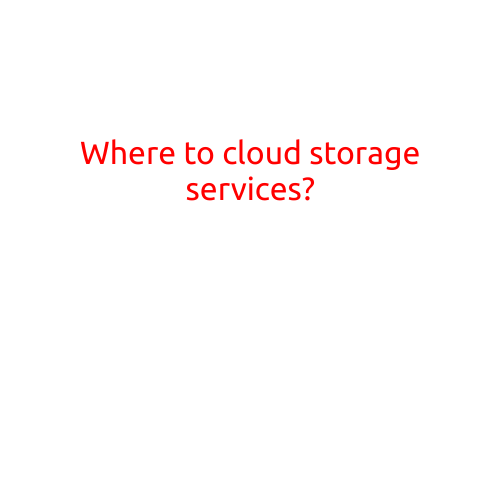
Where to Cloud Storage Services?
In today’s digital age, cloud storage has become an essential tool for individuals and businesses alike. With the rise of mobile devices, social media, and email, our digital footprint has increased dramatically, leading to a surge in the demand for cloud storage services. But with so many options available, it can be overwhelming to choose the right one. In this article, we’ll explore the most popular cloud storage services, their features, and benefits to help you decide where to store your data.
1. Google Drive
Google Drive is one of the most popular cloud storage services, offering seamless integration with other Google apps like Gmail, Google Docs, and Google Sheets. With 15 GB of free storage space, you can store files, photos, and videos, and access them from anywhere. Additionally, you can upgrade to a paid plan with unlimited storage and additional features like team collaboration and advanced security controls.
Pros: Seamless integration with Google apps, affordable pricing, and user-friendly interface.
Cons: Limited free storage space, limited security controls.
2. Dropbox
Dropbox is another well-known cloud storage service, offering 2 GB of free storage space. With its user-friendly interface and robust security features, it’s a popular choice for individuals and businesses. Dropbox also offers paid plans with advanced features like file recovery, remote wipe, and multi-factor authentication.
Pros: Robust security features, easy file sharing, and affordable pricing.
Cons: Limited free storage space, limited integration with third-party apps.
3. Microsoft OneDrive
OneDrive is Microsoft’s cloud storage service, offering 5 GB of free storage space. With its integration with Microsoft Office apps like Word, Excel, and PowerPoint, it’s an excellent choice for businesses that use these apps. OneDrive also offers advanced security features like encryption and access controls, making it a secure option for data storage.
Pros: Robust security features, seamless integration with Microsoft Office apps, and affordable pricing.
Cons: Limited free storage space, limited support for non-Windows devices.
4. Amazon S3
Amazon S3 (Simple Storage Service) is a highly scalable and durable cloud storage service offered by Amazon Web Services (AWS). With a global network of data centers, S3 provides a highly available and secure storage solution for businesses of all sizes. S3 also offers advanced features like bucket policies, access controls, and data analytics.
Pros: Highly scalable, robust security features, and advanced data analytics.
Cons: Complexity of configuration and security setup, high prices for large storage needs.
5. pCloud
pCloud is a cloud storage service that offers 10 GB of free storage space, with advanced features like file synchronization, remote access, and file sharing. pCloud is compatible with multiple devices and operating systems, making it a versatile option for individuals and businesses.
Pros: Free storage space, advanced file synchronization, and compatibility with multiple devices.
Cons: Limited security features, limited support for large businesses.
6. Box
Box is a cloud storage service that offers 10 GB of free storage space, with advanced features like file sharing, collaboration, and workflows. Box is a popular choice for businesses that require robust security features and collaboration tools.
Pros: Robust security features, advanced collaboration tools, and user-friendly interface.
Cons: Limited free storage space, limited support for personal use.
7. Egnyte
Egnyte is a cloud storage service that offers 10 GB of free storage space, with advanced features like file synchronization, remote access, and file sharing. Egnyte is a popular choice for businesses that require robust security features and advanced collaboration tools.
Pros: Robust security features, advanced file synchronization, and user-friendly interface.
Cons: Limited free storage space, limited support for personal use.
Conclusion
In conclusion, choosing the right cloud storage service depends on your specific needs and requirements. Whether you’re an individual or a business, consider the features, pricing, and security controls of each service before making a decision. By carefully evaluating these factors, you can find the best cloud storage service to meet your needs and ensure the security and integrity of your data.





